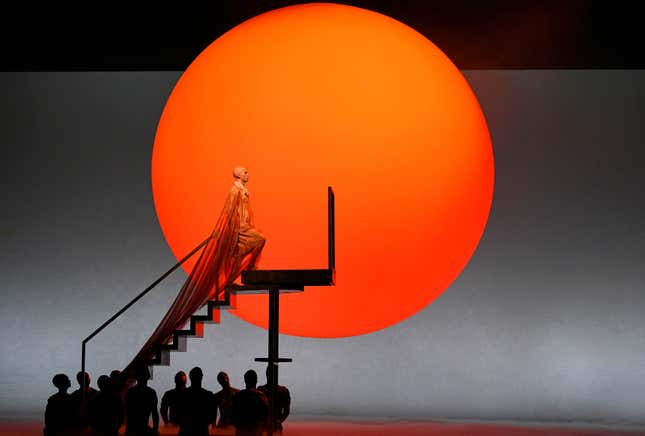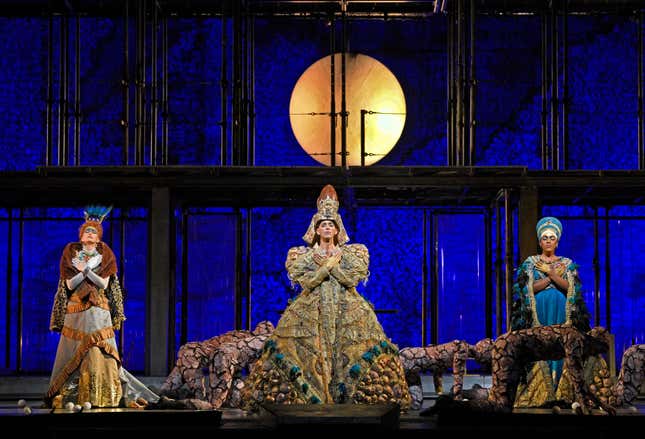
It’s strangely fitting that one of history’s earliest renegades has been immortalized with an opera that also defies convention—and indeed, for those unfamiliar with the music of Philip Glass, the operative word some may use to describe his opera Akhnaten might be “strange.” For the genre’s purists, the Metropolitan Opera’s production of his now 35-year-old composition may prove challenging with its time-bending costumes, stark sets, and deeply repetitive, sometimes monosyllabic song structures sung in English, Ancient Egyptian, Biblical Hebrew and the now-extinct language of Akkadian. A prolific and acclaimed composer, Glass has called Akhnaten his “first extension out of a triadic harmonic language” and an experiment with polytonality (h/t the Met Opera; pdf)
Oh—and then there’s the juggling. Yes, I said juggling; it’s weird, but it works. After all, the first recorded images of jugglers are in hieroglyphics—not to mention the fact that it adds a surprising element to the polytheism vs. monotheism debate at the core of the opera’s plot.
All that said, there’s something deeply arresting and undeniably beautiful in the Met’s staging of this mostly imagined tale inspired by the Egyptian king widely considered the father of monotheism. In his time, Akhnaten (now frequently spelled “Akhenaten”), husband of Nefertiti and father of Tutankhamun, was so controversial a king that much of his legacy was destroyed by those who dethroned him—and his belief that the sun (Aten) was the one true god—in approximately 1336 B.C. And yet, for those in the current monotheistic world, Akhnaten’s legacy is more alive than ever; anyone who claims to believe in one god rather than many is a product of his then-revolutionary theology.
“We know Akhnaten as a man of ideas and, to me, the entire history of humanity is a history of ideas, of culture,” wrote Glass in his 1987 memoir, Music by Philip Glass (h/t the Met Opera; pdf).
Equally revolutionary is the opera’s current, surrealist revival, originally produced by the English National Opera in 2016 and directed by Phelim McDermott, who also directs the Met’s revival. The opulence of the Egyptian age is well placed amid the already too-gorgeous-to-be-true gilded walls and famed Sputnik chandeliers of Lincoln Center. As my seatmate at Saturday’s packed-to-the-rafters performance—a longtime patron of the Met—advised (and I paraphrase here): “With Glass, I think it’s best to think of the music as background for these beautiful visuals.”
As an audience member, that approach is likely closest to what Glass intended, as he has previously described his approach to Akhnaten as “the kind of optical illusion associated with the paintings of Josef Albers, ‘where you could look at it two ways, but not both ways at once; it can’t resolve itself.’”
There are some truly incredible juxtapositions and color stories in Akhnaten—both visual and sonic. Take, for instance, the decision to write Akhnaten as a countertenor, a voice that consistently cuts through the chorus, piercing the air as one might argue the sun pierces the morning sky. Despite the nearly three hours of the Met’s production, I was admittedly newly surprised each time Anthony Roth Costanzo (Akhnaten) began to sing, at times calling into question my own preconceived (and I’d thought well-evolved) notions about power and masculinity as Roth’s voice nestled comfortably between the soprano of his onstage mother, Queen Tye (Dísella Lárusdóttir) and the rich contralto of his wife, Queen Nefertiti, portrayed by the stunning mezzo-soprano J’Nai Bridges, in her Met Opera debut.
The composer’s instincts as a musical dramatist are particularly effective in Akhnaten’s vocal casting. How to represent a figure “so unusual, even unique, as to be virtually unprecedented in Egyptian, and therefore human, history”? Glass opted to cast the pharaoh as a countertenor (one of several neo-Baroque touches to this score). While the renaissance of interest in the countertenor voice has made it much more familiar than it was when Glass initially wrote this music in the early 1980s, Akhnaten’s singing retains a startling effect—at least initially—since he is a silent visual presence onstage until well into the first act. Glass writes Nefertiti as a contralto to be closer in range to her spouse and makes his mother, Queen Tye, a soprano.
But again, for the purists: those who crave a culturally-accurate operatic rendering of this Egyptian king will likely be disappointed; Nefertiti, Tutankhamun, and high priest Horemhab are the only main characters of obvious African descent in this production. But it’s also wise to remember that this is not an opera based on strict adherence to history; the chorus feels equal parts Steampunk and post-apocalyptic, while Queen Tye’s costuming gives echoes of Queen Elizabeth I. Nefertiti’s flowing cobalt blue mane makes it easy to mistake her for the black superheroine we’ve been waiting for, but the six daughters she shares with Akhnaten appear as a multicultural, harmonic coven of dreadlocked sirens.

Is Akhnaten a history lesson? No. In fact, as the production is experimental in form and relatively light on singing for an opera, it may not be the traditional entrée into the genre many may be seeking. But it is a visually stunning, thought-provoking experience—and one that doesn’t necessarily require season tickets to the Met to enjoy (which is good, since the remainder of its run is currently sold out). Saturday’s performance was broadcast in live HD in cinemas across the world; an encore performance will be broadcast via Fathom Events on December 4.

